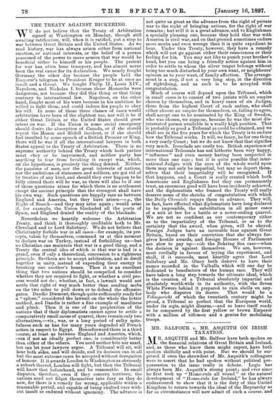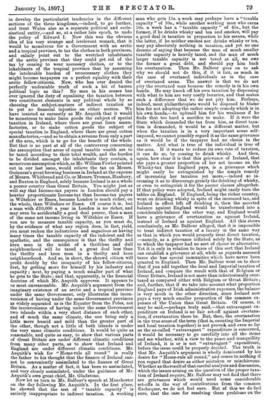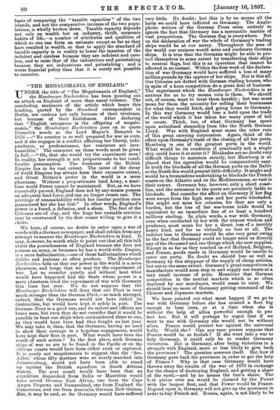MR. BALFOUR v. MR. ASQUITH ON IRISH TAXATION.
MR. ASQ1TITH and Mr. Balfour have both spoken on the financial relations of Great Britain and Ireland, and, as those who know them might expect, have both spoken skilfully and. with point. But we should be sur- prised if even the shrewdest of Mr. Asquith's colleagues were to assert that he had spoken without political pre- possession to the issue really in debate. Logic has always been Mr. Asquith's strong point; and ever since he first took up "Home-rule all round" as the natural development of "Home-rule for Ireland," he has always endeavoured to show that it is the duty of this United Kingdom to return towards the ideal of the Heptarchy as far as circumstances will now admit of such a course. and to develop the particularist tendencies in the different sections of the three kingdoms,—indeed, to go further, and treat Wales also as a separate political and eccle- siastical entity,—and so, at a rather late epoch, to undo the policy of Edward I. Now this was the obvious idea of his very strange and irrelevant remark, that it would be monstrous for a Government with an arctic and a tropical province, to tax the clothes in both provinces, and calmly point out to the wretched inhabitants of the arctic province that they could get rid of the tax by ceasing to wear necessary clothes, or to the inhabitants of the tropical province that by assuming the intolerable burden of unnecessary clothes they might become taxpayers on a perfect equality with their arctic fellow-citizens. Now, who has ever denied the perfectly undeniable truth of such a bit of barren political logic as this ? No man in his senses has ever ignored the duty of equalising the taxation between two constituent elements in any political whole by so choosing the subject-matters of indirect taxation as to put no financial injustice on either section. We have insisted as earnestly as Mr. Asquith that it would be monstrous to make linen goods the subject of special taxation in Ireland, where there are great linen manu- factories, or to make cotton goods the subject of special taxation in England, where there are great cotton manufactories,—and so to obtain a revenue from only a part of the area, which is to go for the benefit of the whole. But that is no part at all of the controversy concerning the assumption that areas of equal taxable wealth are to be taxed according to their total wealth, and the burden to be divided amongst the inhabitants they contain, a monstrous assumption which, as Mr. William Fowler pointed out in our last issue, would relieve the tax on Messrs. Guinness's great brewing business in Ireland at the expense of Messrs. Whitbread and Co. or Messrs. Truman, Hanbury, and Buxton in England, solely because Ireland is as a whole a poorer country than Great Britain. You might just as well say that Income-tax payers in London should pay a heavier proportionate Income-tax than Income-tax payers in Wiltshire or Essex, because London is much richer, on the whole, than Wiltshire or Essex. Of course it is, but a man with £10,000 a year in London is no richer, and may even be accidentally a good deal poorer, than a man of the same net income living in Wiltshire or Essex. If you are to measure taxable capacity, as you must do, by the evidence of what any region does, in fact, yield, you must reckon the industrious and sagacious as having many times the taxable capacity of the indolent and the apathetic, and the consequence is that the thrifty and keen man in the midst of a thriftless and dull neighbourhood will be taxed a great deal less than the thrifty and keen man in a thrifty and keen neighbourhood. And so, in short, the shrewd citizen will profit doubly by the incapacity of his fellow-citizens, first, by getting more for himself by his industry and capacity ; next, by paying a much smaller part of what he gets to the State ; and that, apparently, is the financial doctrine of which Mr. Asquith approves. It appears to us most unreasonable. Mr. Asquith's argument from the imaginary existence of an arctic and a tropical province under the same Government, only illustrates the incon- venience of having under the same Government provinces as widely separated as is the Equator from the Poles, not the inconvenience of having under the same Government two islands within a very short distance of each other, and of much the same climate, the one being only a little more humid and mild than the greater part of the other, though not a little of both islands is under the very same climatic conditions. It would be quite as reasonable, and quite as easy, to show that various parts of Great Britain are under different climatic conditions from many other parts, as to show that Ireland and England are under different climatic conditions. Mr. Asquith's wish for "Home-rule all round." is really the father to his thought that the finance of Ireland can- not be conveniently assimilated to the finance of Great Britain. As a matter of fact, it has been so assimilated, and very closely assimilated, under the guidance of Mr. Asquith's own great chief, Mr. Gladstone. Now let us turn to Mr. Balfour's speech at Manchester on the day following Mr. Asquith's. In the first place, he showed that the test of "taxable capacity" is entirely inappropriate to indirect taxation. A working man who gets 15s. a week may perhaps have a "taxable capacity" of 10s., while another working man who earns 50s. a week has a "taxable capacity" of 45s., but the former, if he drinks whisky and tea and smokes, will pay a good deal in taxation in proportion to his means, while the latter, if he neither smokes nor drinks whisky or tea, may pay absolutely nothing in taxation, and yet no one dreams of saying that because the man of much smaller taxable capacity is heavily taxed, and the man of much larger taxable capacity is not taxed at all, we owe the former a great debt, and should pay him back his overtaxation. Then Mr. Balfour goes on to ask why we should not do this, if it is fair, as much in the case of overtaxed individuals as in the case of overtaxed areas. The answer is that we do not pity the overtaxed man because the remedy is in his own hands. He may knock off his own taxation by dispensing with what to him are very costly luxuries, and that makes such a difference that we do not pity him. Perhaps, indeed, most philanthropists would be disposed to blame him for not adopting the rather simple remedy which is in his own hands,—to upbraid him for his weakness if he finds that too hard a sacrifice to make. If it were the State which demanded the tax from him, as direct taxa- tion is demanded, it would be a different matter, but when the taxation is in a very important sense self- imposed, we cannot possibly regard it as the same grievance as it would be if the taxpayer had no choice in the matter. And what is true of the individual is true of the area. If it wants to reduce its own rate of taxation, it can do so, by ceasing to drink whisky. And then, again, how clear it is that this grievance of Ireland, that she pays a greater proportion of her net income on the Whisky-tax than England pays, is a grievance which might easily be extinguished by the simple remedy of increasing her taxation yet more,—indeed so in- creasing it as to discourage greatly the drinking of whisky, or even to extinguish it for the poorer classes altogether. If that policy were adopted, Ireland might easily turn the tables on England. If England, being the richer country, went on drinking whisky in spite of the increased tax, and Ireland in effect left off drinking it, then the asserted balance against England would be transformed into a considerable balance the other way, and England would have a grievance of overtaxation as against Ireland, instead of Ireland as against England. All this shows conclusively, as Mr. Balfour alleged, that it is impossible to treat indirect taxation of a luxury in the same way as that in which you would properly treat direct taxation, —namely, as a grievance inflicted solely by the State, as to which the taxpayer had no sort of choice or alternative. Yet it is only in relation to taxes of this sort that Ireland can establish a grievance at all, while as regards assessed taxes she has special immunities which have never been granted to England. Then Mr. Balfour went on to show that if you add together the local and Imperial taxation of Ireland, and compare the result with that of Belgium or Great Britain, Ireland is not more than infinitesimally over- taxed as compared either with Belgium or Great Britain ; and, further, that if we take into account what proportion England pays of Irish administrative expenses, the balance is very much in the other direction, since Ireland now pays a very much smaller proportion of the common ex- penses of the Union than Great Britain. Of course, it may be said,—perhaps truly said,—that extravagant ex- penditure on Ireland is no fair set-off against overtaxa- tion, if overtaxation there be. But, then, the overtaxation in the true sense of the term (that is, counting the Imperial and local taxation together) is not proved, and even so far as the so-called " extravagant " expenditure is concerned, it would be necessary to go carefully into all the items and see whether, with a view to the peace and tranquillity of Ireland, it is or is not " extravagant " expenditure, before the issue could be properly decided. The truth is that Mr. Asquith's argument is wholly dominated by his desire for "Home-rule all round," and comes to nothing if you regard that desire as either mistaken or mischievous. Whether as theresult of that careful analysis and discussion, which the issues arising on the question of the proper taxa- tion of Ireland require, Mr. Balfour may not find that there are grievances which would need some considerable set-offs in the way of contributions from the common Exchequer, we do not feel sure. But of this we do feel sure, that the case for resolving these problems on the basis of comparing the "taxable capacities" of the two islands, and not the comparative incomes of the two popu- lations, is wholly broken down. Taxable capacity depends not only on wealth but on industry, thrift, economic habits of life,—a number of attributes and qualities of which no one can form an estimate except so far as they have resulted in wealth, so that to apply the standard of taxable capacity is in reality to lower the taxation of the indolent and careless because they are indolent and care- less, and to raise that of the industrious and painstaking because they are industrious and painstaking ; and a worse financial policy than that it is surely not possible to conceive.








































 Previous page
Previous page